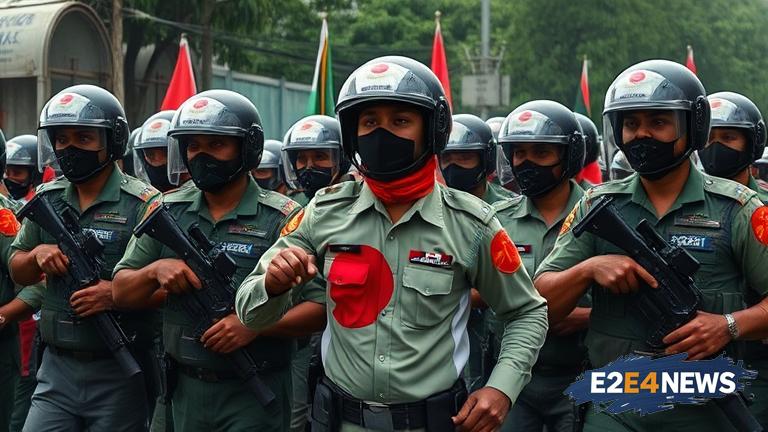Bangladesh has been witnessing a surge in anti-government protests in recent times, with demonstrators taking to the streets to express their discontent with the current administration. The protests have been largely peaceful, but the government has responded with force, leading to clashes between protesters and law enforcement. The latest crackdown has resulted in the arrest of several individuals, including opposition leaders and activists. The government has justified the arrests, citing concerns over national security and public order. However, human rights groups have condemned the move, arguing that it is an attempt to stifle dissent and silence opposition voices. The protests have been sparked by a range of issues, including corruption, economic inequality, and human rights abuses. The government has been accused of using excessive force to quell the protests, with reports of police brutality and arbitrary arrests. The international community has expressed concern over the situation, with the United Nations and other organizations calling for restraint and respect for human rights. The opposition has vowed to continue the protests, despite the crackdown, and has called for the release of those arrested. The government has responded by imposing restrictions on public gatherings and protests, citing concerns over public safety. The situation remains tense, with fears of further violence and unrest. The protests have also highlighted the deep-seated divisions within Bangladeshi society, with many citizens feeling disillusioned with the current government. The opposition has accused the government of being out of touch with the people and of prioritizing the interests of the ruling elite over those of the general population. The government has responded by accusing the opposition of being driven by a desire for power and of using the protests as a means to destabilize the country. The situation is complex and multifaceted, with a range of factors contributing to the unrest. The economy has been a major factor, with many citizens struggling to make ends meet and feeling that the government is not doing enough to address their concerns. The government has implemented a range of measures aimed at addressing the economic challenges, but many feel that these have been insufficient. The protests have also highlighted the need for greater transparency and accountability within government, with many citizens feeling that the current administration is corrupt and unresponsive to their needs. The international community has a role to play in promoting stability and respect for human rights in Bangladesh, and it is hoped that diplomatic efforts can help to resolve the situation peacefully. The situation remains fluid, with the potential for further developments and escalation. The government and opposition must engage in dialogue and work towards finding a peaceful resolution to the crisis. The people of Bangladesh deserve a government that is responsive to their needs and respects their rights, and it is hoped that the current situation can be resolved in a way that promotes stability, democracy, and human rights.
